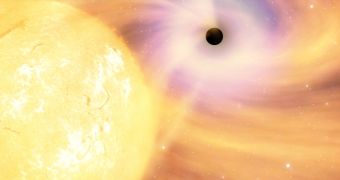The Large Hadron Collider is quickly approaching completion and is expected to begin operation by the middle of the this year. However, while physicists are barely waiting to start experimenting with the world's most powerful particle accelerator, campaigners in the United States would give anything to see the LHC delayed as long as possible or to stop it from ever operating altogether. They believe that, during experiments, dangerous particles or possibly mini black holes will be created and they could destroy the whole Earth in the process.
For example, almost a week ago a couple of residents from Hawaii, namely Luis Sancho and Walter Wagner, initiated a lawsuit against the European Organization for Nuclear Research, owner of the LHC particle accelerator, demanding that the LHC should be stopped from becoming operational before it is proved to be safe. The funny thing it that the US also contributed to the build through the Department of Energy, the National Science Foundation and Fermilab.
According to CERN spokesman James Gillies, the lawsuit initiated by the two men has no scientific foundation, it is a complete nonsense. "The LHC will star up this year, and it will produce all sorts of exciting new physics and knowledge about the universe. A year from now, the world will still be here," said Gillies.
During experiments, the LHC will smash hadron particles - elementary particles made out of quarks - at extremely high energies, in order to recreate the exact conditions that existed less than a billionth of a second after the big bang. By doing so, they hope to be able to understand why particles carry mass or whether the universe has extra hidden dimensions or not.
Particles of death
Wagner and Sancho believe that the LHC will create particles, 'killer strangelets', which will swallow the whole Earth if they escape the particle accelerator. According to theory, strangelet particles are hypothetical structures formed of strange quarks and several other flavors of quarks that make up hadrons - such as protons and neutrons.
It is widely believed that strangelet particles are unstable and should disintegrate as soon as they are created. However, campaigners against the LHC say that stable and negatively charged strangelets may be created ,if escaped out of the particles accelerator, they may begin disintegrating the nuclei of ordinary matter, a chain reaction that could in theory destroy the whole universe.
Nonetheless, LHC engineers revealed more than five years ago in a safety review report that there is "no basis for any conceivable threat". There is an extremely small chance that magnetic monopoles or mini black holes could be created inside such a collider and even if they occur, they would be too short lived to cause any damage.
Previously, Wagner initiated a similar lawsuit against the operation of the Relativistic Heavy Ion Collider, located at Brookhaven National Laboratory. "RHIC started running in 2000 and we're still here," added Gillies.
No danger
In fact, collisions like those taking place inside the LHC occur every second throughout the universe, as cosmic ray particles collide with each other at relativistic speed. The Earth and the Moon have been experiencing collisions with such particles ever since they were created 5 billion years ago, so we shouldn't be here if Wagner was right.
"There is no question that should the defendants inadvertently create a dangerous form of matter such as a micro black hole or a strangelet, or otherwise create unsafe conditions of physics, then the environmental impact would be both local and national in scope, and quite deadly to everyone," claim the accusers in their lawsuit case.
"What we want to do is get this machine up and running. We'll show people that the world is not going to disappear," said Gillies. Unconfirmed sources say that a judge was already assigned to the case and the first hearing will take place on 16 June.

 14 DAY TRIAL //
14 DAY TRIAL //